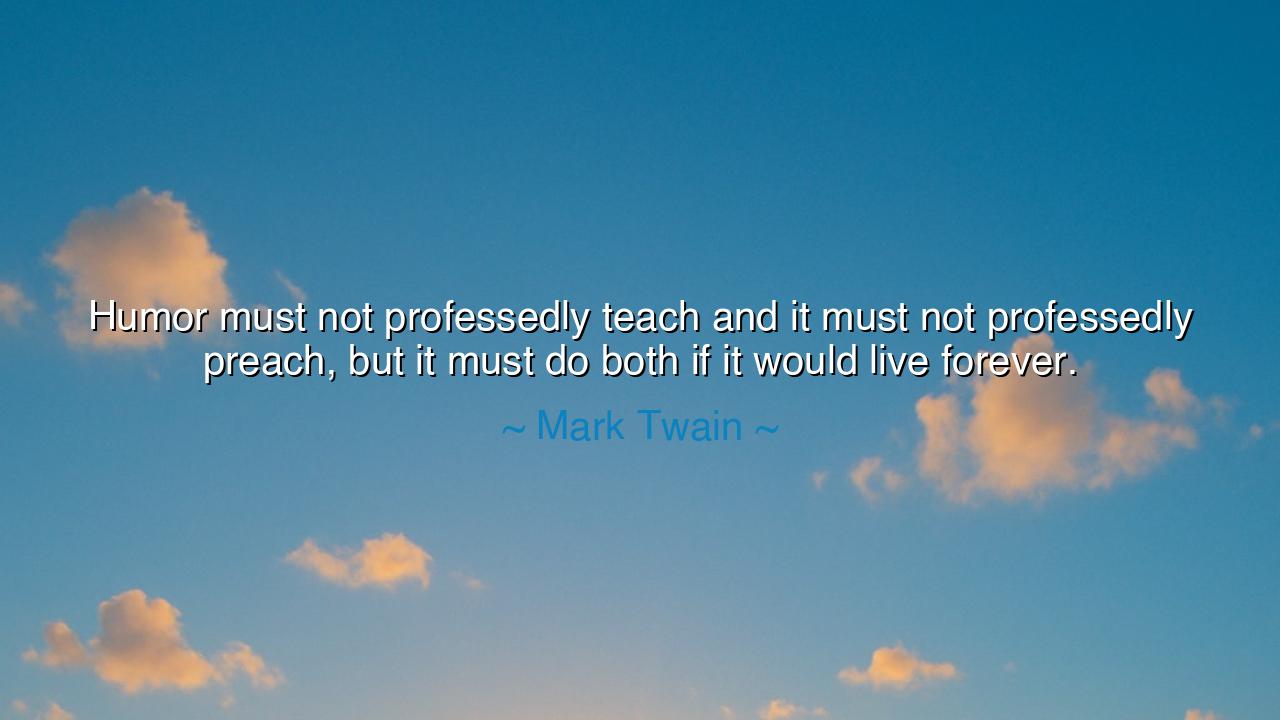
Humor must not professedly teach and it must not professedly
Humor must not professedly teach and it must not professedly preach, but it must do both if it would live forever.






When Mark Twain wrote, “Humor must not professedly teach and it must not professedly preach, but it must do both if it would live forever,” he revealed the sacred paradox of true comedy — that laughter, though it appears light and effortless, must carry within it the weight of truth. Twain, a master of irony and moral vision, understood what the ancients also knew: that humor is not mere entertainment, but a mirror for the soul. It hides its wisdom behind jest and cloaks its lessons in delight, for only when truth is wrapped in laughter does it pass unguarded into the human heart.
In this statement, Twain draws a line between shallow wit and eternal humor. A joke that seeks only to amuse dies with the laughter it provokes; but humor that speaks to the human condition — to folly, pride, hope, and pain — lives forever. It endures because it reveals something enduring within us. Twain himself lived by this creed. Beneath the laughter of The Adventures of Huckleberry Finn lies a fierce rebuke of slavery, hypocrisy, and moral blindness. Yet he never preached openly, never raised the banner of righteousness; he simply let truth laugh its way into memory. His humor survived not because it mocked, but because it enlightened.
The ancients, too, honored this form of laughter. In the plays of Aristophanes, the citizens of Athens laughed not only at the absurdity of their politics but also at the flaws of their own character. His comedies taught as much as they amused — ridiculing greed, vanity, and corruption — yet never did he mount a pulpit. His laughter was a sword sheathed in song. So it was with Twain. His words remind us that humor and wisdom are kin, and that the laughter which endures is the laughter that awakens.
Consider also the example of Charles Dickens, whose novels overflow with humor yet pulse with compassion for the poor and forgotten. He made readers laugh at the buffoonery of his villains and the absurdity of his bureaucrats, but beneath every chuckle was a lesson in empathy. He did not preach charity; he inspired it. He did not command virtue; he invited it through laughter. This is what Twain meant — that humor, though it must never call itself a sermon, must still carry the moral fire that warms the soul long after the jest is told.
To “teach” and “preach” openly, Twain warns, is to risk losing the magic of humor — for laughter resists command. The human heart closes itself against moralizing but opens in joy. When the mind is at ease, truth slips in unseen. The wise humorist knows this. He does not thunder from the mountaintop; he whispers from the tavern, from the stage, from the pages of a story that makes us smile. The teaching of humor, therefore, is not through command but through awakening — a soft light, not a burning fire, that reveals truth without forcing it.
In this way, Twain gives us a principle that extends beyond comedy — a rule for all expression, all persuasion, all creation. Whatever we do — whether we write, speak, or live — must carry both joy and purpose. If our words teach without warmth, they become cold doctrine. If they entertain without depth, they vanish like smoke. But when purpose and joy meet — when laughter and meaning walk hand in hand — the result is art that lives forever. This is the balance Twain achieved, and the balance every creator, teacher, and leader must seek.
Therefore, let this teaching be remembered: laughter is the vessel of truth, and truth without laughter is too heavy for the human heart. Do not preach your wisdom; live it in your joy. Do not force your lessons; let them rise from your humanity. For the humor that endures — the humor of Twain, of Aristophanes, of every soul who loved truth — is born not from pride, but from love: love of life, love of people, love of the fragile, foolish, magnificent human spirit.
So, my listener, laugh — but let your laughter mean something. Speak lightly, but let your words carry weight. For if you would create something that lasts beyond your days, remember what Twain knew: that only the laughter that teaches without teaching, and preaches without preaching, will echo through the ages.






AAdministratorAdministrator
Welcome, honored guests. Please leave a comment, we will respond soon